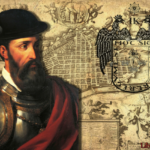 While there has always been loud debate about ‘the author of William Shakespeare’s plays’ – the concept is foolish – there is always a doubt in academe not just about possible or mooted authorship, but also about exactly when WS wrote the plays. Dividing the thirty-seven (38?) into separate sections – comedy, tragedy, history and romance – we present here what could be called a concerted opinion on this contentious subject. As to authorship, it hardly matters! All we need to know is that the plays exist; some of them might have been copied from other authors, some were most definitely inspired by others. It really does not matter. The plays exist, and we choose to place them under the authorship of a man called William Shakespeare. Some might have been written by a man called William Wickleigh. We can be certain that neither C. Marlowe nor F. Bacon wrote any of them. We can also be certain that among Shakespeare’s colleagues in the theatre world there were men clever and erudite to have taken the Master’s notes and sketches and formed them into plays. That was how the First Folios were published. The illustration shows Shakespeare around 1609.
While there has always been loud debate about ‘the author of William Shakespeare’s plays’ – the concept is foolish – there is always a doubt in academe not just about possible or mooted authorship, but also about exactly when WS wrote the plays. Dividing the thirty-seven (38?) into separate sections – comedy, tragedy, history and romance – we present here what could be called a concerted opinion on this contentious subject. As to authorship, it hardly matters! All we need to know is that the plays exist; some of them might have been copied from other authors, some were most definitely inspired by others. It really does not matter. The plays exist, and we choose to place them under the authorship of a man called William Shakespeare. Some might have been written by a man called William Wickleigh. We can be certain that neither C. Marlowe nor F. Bacon wrote any of them. We can also be certain that among Shakespeare’s colleagues in the theatre world there were men clever and erudite to have taken the Master’s notes and sketches and formed them into plays. That was how the First Folios were published. The illustration shows Shakespeare around 1609.
Comedies
The Comedy of Errors 1590
The Taming of the Shrew 1591
Love’s Labours Lost 1593
Two Gentlemen of Verona 1593
A Midsummer Night’s Dream 1594
The Merchant of Venice 1596
The Merry Wives of Windsor 1597
As You Like It 1598
Much Ado About Nothing 1599
Twelfth Night 1600
Troilus and Cressida 1602
All’s Well That Ends Well 1603
Measure for Measure 1604
Two Noble Kinsmen? 1613
Tragedies
Titus Andronicus 1590
Romeo and Juliet 1595
Julius Caesar 1599
Hamlet 1601
Othello 1604
King Lear 1605
Macbeth 1605
Antony and Cleopatra 1606
Timon of Athens 1606
Coriolanus 1608
Histories
Henry VI Pts. 1, 2 & 3 1591/92
Richard III 1592
Richard II 1595
King John 1596
Henry IV Pt. 1 1597
Henry IV Pt. 2 1598
Henry V 1599
Henry VIII? 1613
Romance
Pericles, Prince of Tyre 1697
Cymbeline 1609
A Winter’s Tale 1610
The Tempest 1611
From this table we can see that William Shakespeare’s most prolific years were 1591, 1592 (both Henry VI Pt. I and Richard III), 1595, 1596, 1597, 1599 and especially 1599, when he wrote Henry V, Much Ado About Nothing and Julius Caesar. He wrote his best known history play, Richard III, nine years before Hamlet. Henry VIII (1613) and Two Noble Kinsmen are italicised because there is no agreement between experts over how much WS was helped by others, and by whom, in their composition.
Classifying The Merchant of Venice as a ‘comedy’ has cost the experts many a heartache, as it is hardly comic to end the play with a character losing his fortune, his house, his means of making a living, his religion and his daughter. Perhaps Shylock would have preferred to lose a pound of flesh as well?








Leave A Comment